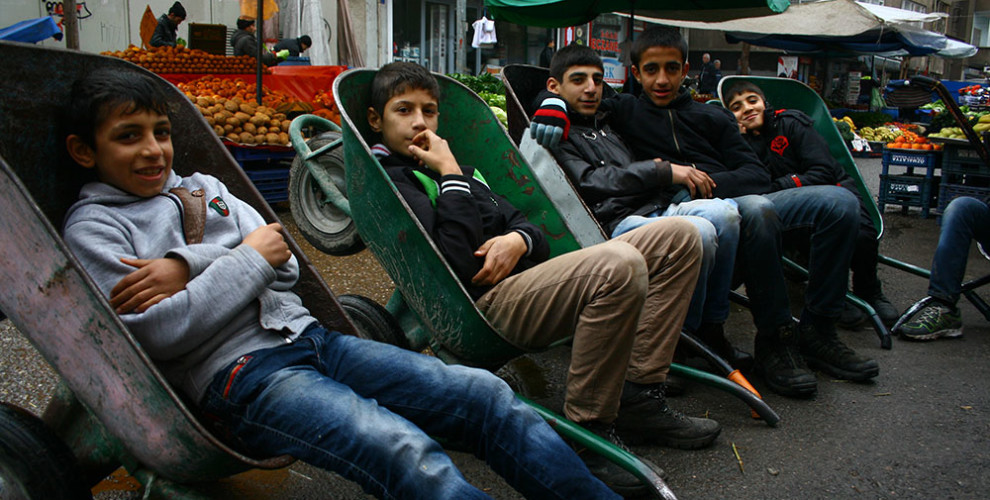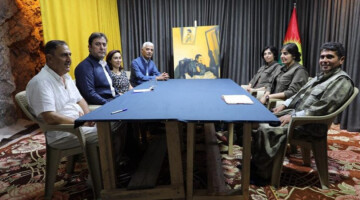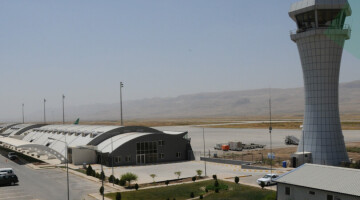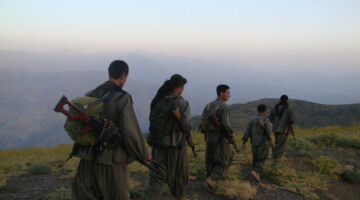One of the drastic problems the Amed city is coping with are children that work or are made to work in the street. At almost every corner there is a child selling handkerchiefs and bubble gums, shining shoes, collecting paper from trash cans, carrying cargo carts in neighbourhood markets.
Some of these children are used by their families to contribute to their financial situation to make ends meet, others work voluntarily to raise their pocket money. The common feature of all of them is that they are children of poor families and victims of the forced migration.
The problem of the children that work or are made to work, which has become rampant for more than 20 years, has emerged recently in plain view ever so, following the demolition of the historic district Sur and the destruction of thousands of houses.
For the first time in history a Research Commission was set up by the Turkish Parliament in 1996 to identify the persons who were displaced from their villages and to investigate the problems they are dealing with.
The Commission conducted extensive research for 4 months in the Northern Kurdistan region including the cities of Amed, Mardin, Urfa, Şırnak, Siirt, Batman and Hakkari. In the official reports of the state it was recorded that 905 villages and 2523 hamlets had been emptied, and the number of displaced villagers was said to be 400 thousand.
According to official reports the displaced population at that time was stated to amount to 400 thousand people, while informal numbers however report of more than two million displaced people. This number doubled between 1996 and 2001.
CHILDREN ARE FORCED TO WORK
Those families that were forcibly expelled from their soil and land, have now become day labourer, are working in construction, are going in summer to Turkish cities for nut harvesting and cropping potatoes onions, carrots and tomatoes in the fields, or working in cotton fields in the fall. Also the children of those families have been left with no choice other than working in the streets. Some of them are working of their own accord, while others are pushed by their families.
In the city centre of Amed children aged between 9 and 13 years are forced to work in the streets by collecting paper, shining shoes, selling handkerchiefs and using transport cargo carts.
Some of the children that work or are made to work in the streets of Amed are:
BAGER WHO IS COLLECTING PAPER
Bager is 14 years old. His family emigrated in 1997 from Mazıdağı district of Mardin. He is trying to make a contribution to the family budget by collecting paper together with his two years younger brother Harun. Last year his mother, father and sisters went to harvest nuts. But this year they did not go because his father found a job in the construction work. Every day Bager and his little brother are trying to make money by collecting paper and cardboard that have been thrown into trash cans. The daily gains are judged by the performance of that day between 8 to 20 lira (between 2 and 5 Euro). The paper is later sold to trash dealers by kilograms. One kilogram of cardboard and paper is sold for 1,50 lira (36 Cent) and one kilogram nylon and plastics for 1 lira (24 Cents).
SÜLEYMAN WHO IS SELLING SİMİT
Süleyman K. is a 13-year-old boy, who is a student at the Tevfik Fikret Primary School. He is trying to contribute to his family’s financial situation by selling simit (bagel) half a day when he going to school, and full-time at weekends when he is not in school and during holidays. Süleyman said: "When I work all day long, I get to sell between 90 and 110 simits until evening. During school time it is good if I can only sell between 40 and 50, though sometimes I only sell 20. The remaining ones I return to the bakery. If I do not sell enough simits, they won't let me sell them again. Therefore I go to places like Yenişehir, Dağkapı, Balıkçılarbaşi to sell them. When I finish the whole work, I get paid and I give that money to my mother."
RAMAZAN WHO IS CARRYING LOAD
Ramazan G. is 12 years old. He is living together with his family in Ben u Sen neighbourhood in a temporary shelter. Every day he is carrying load in the markets of the Yenişehir neighbourhood with his cargo cart and is trying to make some money. He said: "When I go to school, I work afternoons. Now we are on school holidays. Every morning I carry load. Some give 1 lira (24 Cent) and some are giving 2 lira (48 Cent). I am taking whatever they give. In that way I make a daily win of 15 to 20 lira. The money I make I am giving my mother. My father is unemployed."
MAZLUM WHO IS SHINING SHOES
Mazlum, who is a shoe shiner in Dağkapı Square, is 13 years old. He was born in Amed, but his family is originally from Kulp district. They used to live in a house in the Hasırlı neighbourhood of Sur together with his uncles. Now he is staying with his family in the Kaynartepe/Bağlar neighbourhood. Mazlum said: "My father works if there is a job. My elder brother is working at a kebab shop on daily allowance. I come to Dağkapı every day and shine shoes. I do not work in Bağlar. Because there no one wants his shoes shined and pay for it. Here I shine shoes for 1 lira. Sometimes I dye 3 shoes, sometimes 7 to 8 pairs. In the best days, I manage to shine around 30 shoes."













